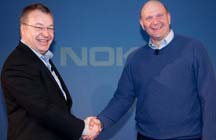News
Microsoft and Nokia Ink Strategic Windows Phone Alliance
Microsoft and Nokia today announced a global strategic alliance on mobile smartphone technologies, with Nokia planning a worldwide market push based primarily on the Windows phone platform.
Nokia CEO Stephen Elop and Microsoft CEO Steve Ballmer took to the stage in London to announce the deal. The event represented a Microsoft reunion of sorts. Elop was hired as president and CEO at Nokia in September, having previously served as president of the Microsoft Business Division.
As a consequence of the deal, Symbian, Nokia's open source operating system for smartphones, will become "a franchise platform," according to Nokia's announcement. Symbian-based device sales will continue but the company plans to "retain and transition the installed base of 200 million Symbian owners," according to a Nokia released statement.
 |
| Elop (left) and Ballmer at Windows phone announcement. |
The news of Symbian's impending wind-down, plus the strategic agreement between Nokia and Microsoft, apparently did not sit well with Nokia's workforce. Some Nokia workers walked out of Nokia's facilities today, according to a Geek.com article, which suggested that about 1,500 jobs associated with Symbian are at stake at Nokia's Tampere facility alone.
Aidan Biggins, a recruiter at Google EMEA, sent a Twitter message that Google is looking to hire Nokia software engineers. A Google Vice President of Engineering, Vic Gundotra, is thought to have slammed the Microsoft-Nokia deal in advance by sending a Twitter message that "Two turkeys do not make an Eagle." Gundotra previously served as a general manager at Microsoft.
Nokia plans to continue its plans to ship products based on the Linux-based MeeGo open source mobile operating system later this year. However, the company's short-term plans for the platform are a bit hazy. MeeGo seems relegated to more experimental efforts. Nokia's announcement stated that "MeeGo will place increased emphasis on longer-term market exploration of next-generation devices, platforms and user experiences."
Under the Windows phone deal between Microsoft and Nokia, the companies plan to create "mobile products and services" for existing global markets, as well as "completely new service offerings," according to the joint announcement. They will collaborate on a roadmap for developing future mobile products and share product marketing efforts.
Nokia will use Microsoft's Bing search engine, as well as the Microsoft adCenter platform for Internet-based advertising. Both of those Microsoft technologies will be used in Nokia Maps.
Ballmer said during the announcement that the two companies are "already working to develop the first Nokia Windows phone." The alliance will "unlock opportunities" for developers and service providers, he added.
Burning Platform
The news of the Windows phone alliance comes on the same day that Espoo, Finland-based Nokia announced executive shakeups. The reshuffling was anticipated because of Elop's "burning platform" memo issued last week. This scathing memo blamed Nokia's slipping performance on leadership problems and internal attitudes at the company.
"The first [Apple] iPhone shipped in 2007, and we still don't have a product that is close to their experience," Elop wrote in the memo. "[Google] Android came on the scene just over 2 years ago, and this week they took our leadership position in smartphone volumes. Unbelievable."
A newly issued report from Gartner, "Competitive Landscape: Mobile Devices, Worldwide, 4Q10 and 2010," seemed to echo Elop's sentiments. Roberta Cozza, Gartner's principal research analyst, said in a released statement that "Symbian's market share dropped further in the fourth quarter of 2010 to 32.6 percent or 32.6 million units. This allowed Android to overtake Nokia's Symbian unit sales during the fourth quarter of 2010."
Gartner's analysis of 2010 worldwide mobile device sales still lists Nokia as No. 1 with its 28.9 percent market share. Nokia is trailed in mobile device sales by Samsung (17.6 percent), LG Electronics (7.1 percent), Research in Motion (3.0 percent), Apple (2.9 percent), Sony Ericsson (2.6 percent) and Motorola (2.4 percent), according to the report.
Nokia Executive Reorg
Nokia reshuffled its board and created two new business units, Smart Devices and Mobile Phones. Symbian smartphones, MeeGo computers and strategic business operations, formerly under the purview of the Mobile Solutions business unit, have now been rolled into the Smart Devices business unit. The Smart Devices group, led by Jo Harlow, will also be responsible for the success of devices based on the Windows phone platform.
Nokia's Mobile Phones business unit will be focused on connecting "the next billion people" to affordable Internet access. It will be led by Mary McDowell. Nokia also switched out leaders in its Markets, Services and Developer Experience, NAVTEQ, and corporate and legal segments.
Risky Move?
Nokia likely will take big risks in moving to Microsoft's new consumer mobile platform. Windows phone devices hit the market relatively recently, in mid-October, when the OS was rolled out on nine devices. It's currently supported by 60 operators in 30 countries, according to Microsoft.
Bill Koefoed, general manager of investor relations at Microsoft, said last month that more than two million Windows Phone 7 licenses have been purchased by handset makers. However, the actual sales data may be less clear than that number.
Gartner ranked the market share of Microsoft's OSes for smartphones dead last, with 4.2 percent of the global market, according to its report. The top OSes for smartphones in 2010, according to Gartner, were Nokia's Symbian (37.6 percent), Google's Android (22.7 percent), Research in Motion's OS (16 percent) and Apple's iOS (15.7 percent).
Ted Schadler, vice president and principal analyst at Forrester Research, recommends that enterprise customers focus on Apple's iOS, Google's Android and RIM's QNX mobile platforms. However, he now adds Microsoft to the roster, based on the Nokia deal.
"Now that these two megaliths are partnering up, Microsoft's mobile OS has a chance for relevance," Schadler wrote in a Forrester blog post. However, he cautioned that Microsoft still has to show success porting a lot of its business applications to mobile phone and tablet devices first, and then "execute brilliantly."
About the Author
Kurt Mackie is senior news producer for 1105 Media's Converge360 group.